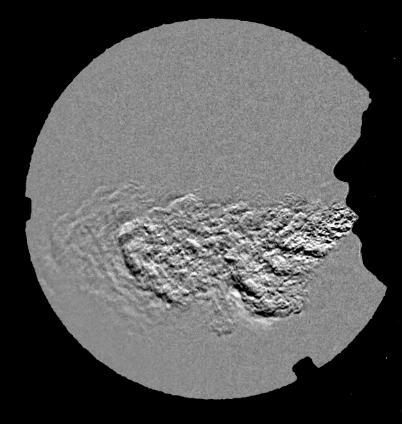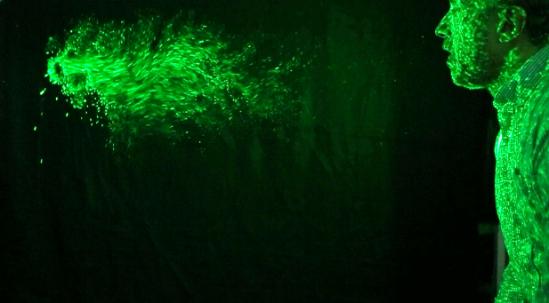Summary
The impact of the COVID-19 pandemic on hospitals resulted in many noncritical procedures being cancelled or postponed. Dr Nolan’s research studied various procedures to reduce or eliminate the risk of aerosols (liquid droplets in the air) spreading across the hospital. This included looking at the effectiveness of face masks, aerosol leaks during keyhole surgery, infection control during ophthalmic procedures, aerosol spread when critical COVID-19 patients are placed on oxygen, and mask effectiveness during exercise and speech and language therapy.
The research has led to changes in practices in the Mater hospital, protecting patients and clinicians from COVID-19. The findings – shared via peer review publication, the media and social media – have illustrated the importance of social distancing and wearing a mask, helping slow the spread of the disease.
Research description
In the early stages of the COVID-19 pandemic, it became apparent that the spread of the virus via aerosol and limitations in the supply and effectiveness of PPE were critical contributors to the infection rate. All non-essential surgery was halted due to risk of spreading aerosols, and the need for solutions was clear.
In April 2020, Professor Cahill therefore began investigating the problem of aerosol dispersion during surgery. Dr Nolan volunteered his time and expertise to this investigation, and his custom Schlieren facility was relocated to the old operating theatres of the Mater Hospital. Schlieren is a real-time optical technique, whereby local changes in the refractive index of air are made visible. In other words, by looking at how rays of light bend, this technique visualises human breath in the air in a striking way (see image below).
What began as a short-term project grew in scope as the effectiveness of Schlieren in diagnosing sources of aerosol became apparent. The Schlieren facility remains in place in the Mater and is in continuous operation helping specialists understand how best to design their varied medical procedures to eliminate aerosol risk.
Examples include:
- Exploring the effectiveness of a device called an ‘intubation box’, a clear plastic box that is placed over a patient’s head and shoulders before they are intubated, in an attempt to reduce risk of infection.
- Examining leaks of CO2 gas that occur from the abdomen during a procedure known as a laparoscopy – an operation to examine the organs in the abdomen. These jets of gas contain bodily fluids in aerosol form and present an infection risk. Dr Nolan’s expertise in fluid flow was invaluable in accelerating the development of a device to target the leaks.
- Conducting a study, involving volunteers from hospital staff, to mitigate risks associated with high-flow nasal oxygen. This is often given to critical COVID-19 patients and generates a significant jet of gas from the airway, creating environments with high amounts of aerosol.
- Working with Periodontists from Trinity College Dublin, performing a study on aerosol generation during dentistry.
- Measuring the effectiveness of different facemasks during exercise. This was expanded to include a number of designs, including commercial and homemade masks, of interest to UCD Sport. Work on novel mask designs in ongoing, in collaboration with the National College of Art and Design (NCAD).
- Investigating, in collaboration with Speech and Language Therapists, how the tools they use can be made safe from aerosols. Research in PPE strategies for ophthalmologic procedures was performed as well.
Dr Nolan’s work has had immediate and direct clinical impact. It has informed design of medical equipment and has been highly informative regarding patient and personnel protection from airborne viral transmission. It has also enhanced public awareness of how COVID is transmitted and the need to socially distance.
— Prof Conan McCaul, Consultant at the Mater Hospital
 Ophthalmology research conducted by Dr Nolan and colleagues revealed that wearing facemasks under surgical drapes actually increases the risk of aerosol exposure. This finding has been communicated via a Webinar for the Irish College of Ophthalmologists, resulting in revision of hospital policy in three centres. This is directly protecting surgeons and patients in these hospitals. A publication is being prepared, so that the findings can inform policy in other centres as well.
Ophthalmology research conducted by Dr Nolan and colleagues revealed that wearing facemasks under surgical drapes actually increases the risk of aerosol exposure. This finding has been communicated via a Webinar for the Irish College of Ophthalmologists, resulting in revision of hospital policy in three centres. This is directly protecting surgeons and patients in these hospitals. A publication is being prepared, so that the findings can inform policy in other centres as well.